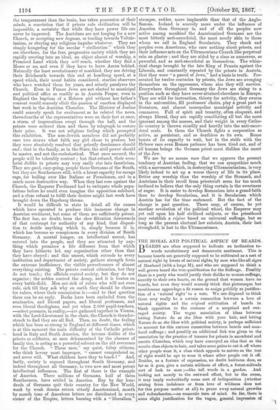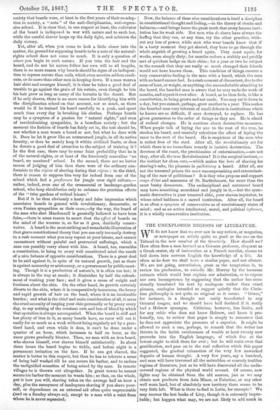THE MORAL AND POLITICAL ASPECT OF BEARDS. society that beards
were, at least in the first years of their re-adop- tion in society, a " note " of the anti-disciplinarian, anti-repres- sive school. It is clear that, in one respect at least, the cultivator of the beard is indisposed to war with nature and to snub her, while the careful shaver keeps up the daily fight; and achieves the daily victory.
Yet, after all, when you come to look a little closer into the matter, the ground for supposing beards to be a note of the natural- rights school does not come to much. It is only a question of where you begin to curb nature. If you trim the hair and the beard, and do not let nature follow her own will to all lengths, there is no more reason why beards should be signs of an indisposi- tion to repress nature than nails, which even ascetics seldom eradi- cate, or do more than other men in keeping down. If a man wears a hair shirt and scourges himself, it is clear he takes a good deal of trouble to go against the grain of his nature, even though he lets his hair grow as long as many of the hermits in the desert. But if he only shaves, there is no more reason for identifying him with the disciplinarian school on that account, nor so much, as there would be if he trained his beard carefully to a peak, and spent much time every day in brushing his clothes. Perhaps beards may be a symptom of a passion for "natural rights," and even -of revolutionizing sympathies, in a beardless society ; but the moment the fashion of beards has fairly set in, the teat should be, not whether a man wears a beard or not, but what he does with it. Does he let it grow like an untraversed jungle, in all its native ferocity, or does he merely keep it within civilized limits, or does he devote a good deal of attention to the subject of training it ? In the first case, there may be some faint probability that he is -of the natural-rights, or at least of the ferociously masculine no beard, no manhood' school. In the second, there are no better means of judging of him than there were of the ordinary con- formists to the rigime of shaving during that re'gime ; in the third, there is reason to suppose him very far indeed from one of the school which feel a preference for jungle over rigid culture,— rather, indeed, even one of the ornamental or landscape-garden school, who keep shrubberies only to enhance the precisian effects of the "trim gardens of retired leisure."
But if it be thus obviously a hasty and false impression which sasociates beards in general with revolutionary, democratic, or even Fenian sympathies as their cause,—by the way, the beard of the man who shot Macdonnell is generally believed to have been false,—there is some reason to assert that the effect of beards on the mind of the wearers is, so far as it goes, decidedly conser- vative. A beard is the most striking and remarkable illustration of that grave constitutional theory that you can only too easily destroy tin a rash moment what you may repent at your leisure, and cannot reconstruct without painful and protracted sufferings, which a man can possibly carry about with him. A beard, too, resembles -a constitution, in being to every well constituted mind the result -of a nice balance of opposite considerations. There is a great deal to be said against it, in spite of its natural growth, just as there is against monarchy or aristocracy, or a government by public meet- ing. Though it is a production of nature's, it is often too hot; it is always in the way at meals ; it diminishes by half the refresh- ment of washing your face ; and it gives a sense of weight and fuzziness about the chin. On the other hand, its growth certainly diverts to the chin, where it is comparatively innocuous, the heavy and rapid growth of hair on the head, where it is an intolerable burden ; and what is the chief and main consideration of all, it saves the cruel necessity of reaping your chin personally or by proxy every -day, to say nothing of the constant cuts and loss of blood by which that operation is always accompanied. When the beard is stiff and has plenty of iron in it, as many beards have, no razor will cut it easily for so much as a week without being regularly set by a prac- tised hand, and even while it does, it can't be done under a quarter of an hour, which increases to half an hour, as the razor grows gradually blunter. Then, no man with an iron beard, who shaves himself, ever shaves himself satisfactorily. In about three hours the beard begins to tickle, and before night is a -permanent irritation on the face. If he can get shaved, the matter is better in this respect, but then he has to tolerate a sense -of being half washed till he can secure his barber, and to endure the undignified sensation of being seized by the nose. In remote villages he is thrown out altogether. In great towns he cannot secure his barber the moment he wants him ; so that, on the whole, put it how you will, shaving takes on the average half an hour a day, plus the annoyance of inadequate shaving if you shave your- self, or dependence on an external aid often quite unprocurable (and on a Sunday always so), except to a man with a valet from whom he is never separated.
Now, the balance of these nice considerations is itself a discipline in constitutional thought and feeling,—in the theory of checks and balances,—and brings home the great truth that every human insti- tution has its weak side. But men who do shave have always the feeling that they can, at any time, try the other practice, with-
out any loss of power, while men who wear beards know that if in a hasty moment they get shaved, they have to go through the whole anguish of growing a beard again. They must again, for weeks, seem simply dirty; for months endure a stubbly and prickly sort of quickset hedge on their chins ; for a year or two be subject to the remark that they are really so much changed their friends would not have known them. This condition of things ensures a very conservative feeling in the man with a beard, which the man with no beard cannot feel. In a rash moment of discontent, due to the sense of heat, or weight, or anything else uncomfortable attaching to the beard, the bearded man is aware that he may undo the work of months, and repent it ever after. A beard, as he then feels, is like a constitution, in being grown and not made. You may cubit down in a day, but you cannot, perhaps, grow another in a year. This makes the bearded man very tolerant of small defects in institutions which he knows are so difficult, if once destroyed, to replace. He has given guarantees to the order of things as they are. He is afraid of radical changes. He is cautious about destructive measures. When people talk of laying the axe to the root of the tree, he strokes his beard, and mentally calculates the effect of laying the razor to the root of the beard. He is suspicious of the man who is rather free of the steel. After all, the revolutionary act for which there is no immediate remedy is incisive destruction. The devotees of the razor, the precisianists of extermination,—are not they, after all, the true Revolutionists? It is the surgical instinct,— the instinct for clean cuts, —which makes the love of shaving for shaving's sake, the pleasure in guillotining a beard. After all, are not the tonsured priests the most uncompromising and exterminat- ing of the race of politicians ? It is they who propose and support coups d'itat and massacres of St. Bartholomew, far more than the most bushy democrats. The undisciplined and untutored beard may have something anarchical and jungly in it,—but the syste- matic destructive is your tonsured abbe, your shaven inquisitor, to whose mind baldness is a sacred institution. After all, the beard is as often a symptom of conservative as of revolutionary states of mind ; and as an active intellectual, moral, and political influence, it is a wholly conservative institution.



































 Previous page
Previous page